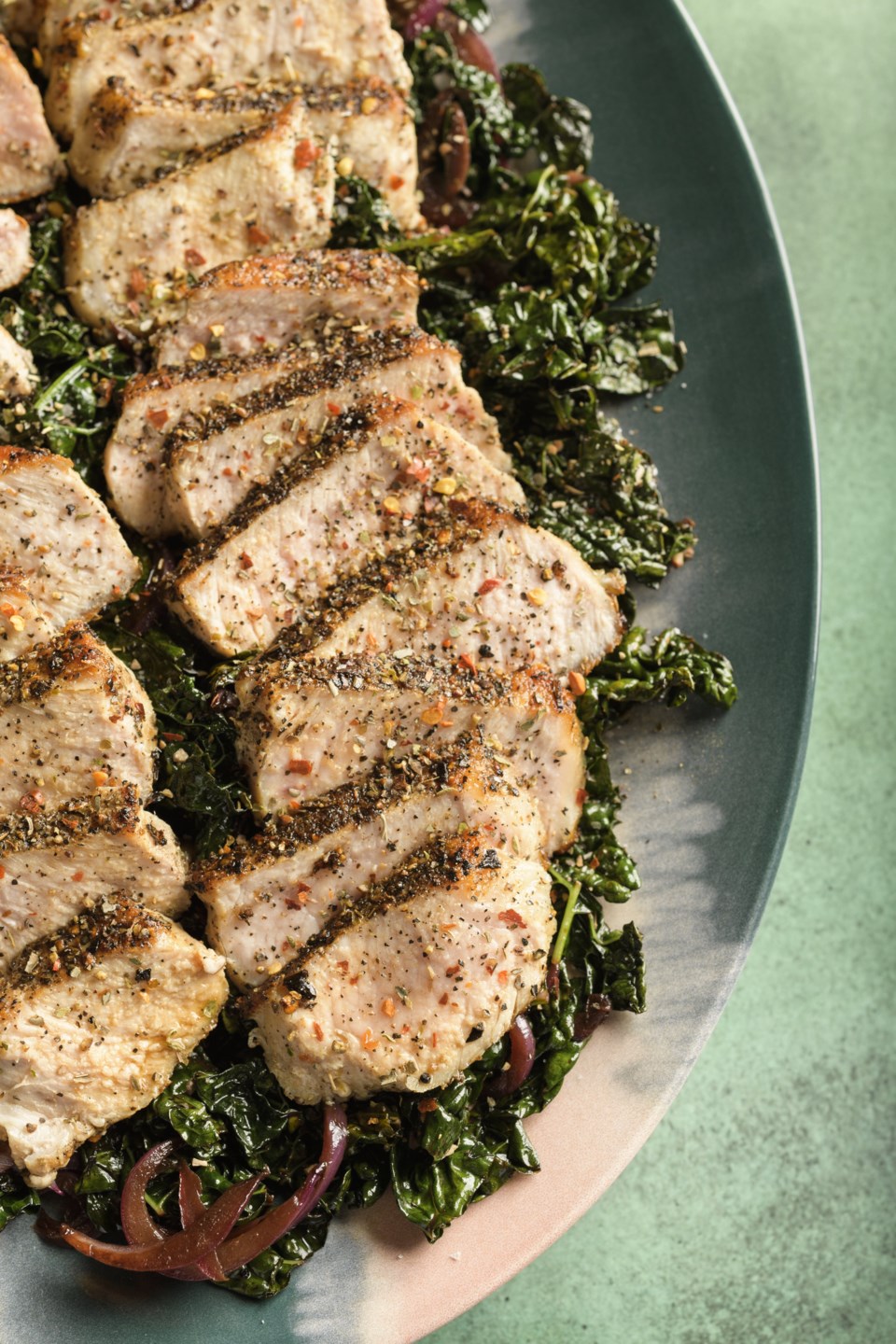Despite how commonly recipes call for marinating meat, it’s rarely worth it.
Marinades do a poor job of flavoring meat because the molecules of any flavorings, except for salt, are too big to penetrate the surface. Besides, you’re then left cooking wet meat, which inhibits flavorful browning.
That’s why we season meat before cooking, then sauce later, as in this one-pan Florentine pork chop recipe from our book “Tuesday Nights Mediterranean,” which features weeknight-friendly meals from the region. The recipe is an adaptation of a recipe for braciuole nella scamerita from Artusi’s “Science in the Kitchen and the Art of Eating Well,” a landmark Italian cookbook that was first published in 1891 and remains in print today.
We season the chops with oregano, red pepper flakes, salt and black pepper, later searing them in a skillet with a garlic-infused oil. The pork is sliced and served over a bed of lacinto kale that’s been cooked with sliced red onion in a red wine reduction. The wine, balsamic vinegar and remaining garlic oil mix with the pork’s natural juices and moisture released by the vegetables for a delectable, minimalistic sauce.
The slices of toasted garlic used to flavor the oil add crispy bits of allium that contrast the silky greens, and a tablespoon of balsamic vinegar brightens the dish. A final sprinkle of the pork’s seasoning mix adds another layer of flavor.
Whereas Artusi indicates cutlets from where the loin and leg meet, we call for boneless pork loin chops. Lacinato kale is sometimes sold as Tuscan or dinosaur kale.
And if you prefer to serve the chops whole, that’s fine. Either way, the chops will release flavorful juices as they rest — make sure to pour them over the pork and kale before serving.
Start to finish: 40 minutes
Servings: 4
2 teaspoons dried oregano
1 teaspoon red pepper flakes
Kosher salt and ground black pepper
Four 6-ounce boneless pork loin chops, each about 1 inch thick, patted dry
4 tablespoons extra-virgin olive oil, divided, plus more to serve
6 medium garlic cloves, thinly sliced
1 cup dry red wine
1 medium red onion, halved and thinly sliced
2 bunches lacinato kale, stemmed and sliced crosswise about 1/2 inch thick
1 tablespoon balsamic vinegar
In a small bowl, stir together the oregano, pepper flakes, 2 teaspoons salt and 1 tablespoon black pepper. Measure 1 tablespoon of the mix into a small bowl; set aside. Sprinkle the remaining seasoning mix onto both sides of the pork chops, then rub it into the meat.
In a 12-inch skillet over medium-high, heat 2 tablespoons of oil until shimmering. Add the garlic and cook, stirring, until golden brown, 1 to 2 minutes. Using a slotted spoon, transfer the garlic to a small plate. To the oil remaining in the pan, add the chops and cook until well browned on the bottoms, 3 to 5 minutes. Flip and continue to cook until the centers reach 135°F, another 3 to 4 minutes. Transfer to a cutting board and tent with foil.
Add the wine to the skillet and cook over medium-high, scraping up any browned bits, until reduced to about 2 tablespoons, about 5 minutes. Add the remaining 2 tablespoons oil, the onion and half the kale, then cook, tossing with tongs, until the kale begins to wilt, about 30 seconds. Add the remaining kale and continue to cook, tossing and stirring, until the kale is tender and the onion is softened, about 3 minutes.
Off heat, add the toasted garlic and the vinegar, then toss to combine. Taste and season with salt and pepper, then transfer to a serving platter, creating a bed for the pork. Cut the chops into thin slices and arrange over the kale. Pour over any accumulated juices, then sprinkle with the reserved seasoning mix.
EDITOR’S NOTE: For more recipes, go to Christopher Kimball’s Milk Street at
Christopher Kimball, The Associated Press



